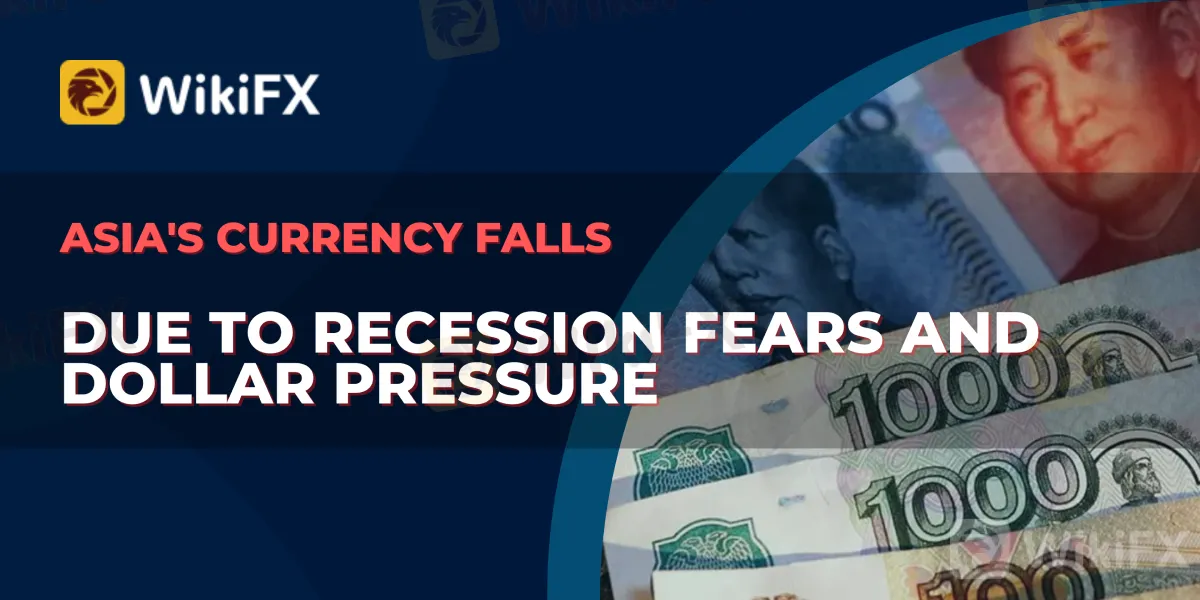简体中文
繁體中文
English
Pусский
日本語
ภาษาไทย
Tiếng Việt
Bahasa Indonesia
Español
हिन्दी
Filippiiniläinen
Français
Deutsch
Português
Türkçe
한국어
العربية
Asia's Currency Falls Due To Recession Fears And Dollar Pressure
Abstract:On Monday, most Asian currencies sank dramatically against the US dollar as concerns about a worldwide recession and increasing interest rates in the West weighed heavily on risky assets.

China's yuan was one of the day's worst performers, falling 0.5% to a fresh 2-year low of 7.1643. Despite many efforts taken by the People's Bank of China to limit additional currency losses, the yuan plummeted.
The PBOC said that it would increase the foreign exchange risk reserve requirements for financial institutions, making shorting the currency more costly. In addition, the central bank established a positive daily midpoint for the yuan.
The developments come as the yuan has been pummeled this year by a combination of dollar appreciation, lax monetary policy, and slowing Chinese economic growth.
The attention is now on the next Chinese PMI data for September, which is expected on Friday, for more indications of a possible Chinese economic revival.
Other Asian currencies fell to multi-year lows as well. The Indian rupee fell to a historic low of over 81 per dollar, while the South Korean won fell 0.8% to a more than 13-year low.
The Philippine peso likewise touched a new low versus the US dollar, while the Thai baht was Southeast Asia's worst performer, falling 0.9%.
The Japanese yen surpassed 144 per dollar, returning to levels recorded before the government intervened in currency markets. According to data released on Monday, although Japanese company activity increased marginally in September, the economy's outlook remained hampered by rising inflation.
The dollar index and dollar futures remained locked above 20-year highs as worries of a worldwide economic crisis grew after a slew of disappointing European economic data last week. The anticipation of more Federal Reserve interest rate rises boosted the greenback.
Currencies outside of Asia fell as well. The British pound hit a new low, as the euro moved farther away from parity with the US dollar. Markets anticipated that increasing interest rates and soaring inflation would be a double blow for global economic development.
Rising US interest rates and worries of a future recession have pummeled high-yield, high-risk Asian currencies this year. This trend is projected to continue for the rest of the year.
About WikiFX
WikiFX is a platform for searching worldwide corporate financial information. Its primary duty is to provide the included foreign exchange trading organizations with basic information searching, regulatory license seeking, the credit assessment, platform identification, and other services.

Over 39,000 brokers, both licensed and unregistered, are listed on the network. WikiFX's staff has been hard at work with 30 financial authorities from across the world to verify that the information supplied is factual and correct.
Stay tuned for more Forex news.
Download the WikiFX App from the App Store or Google Play Store.

Disclaimer:
The views in this article only represent the author's personal views, and do not constitute investment advice on this platform. This platform does not guarantee the accuracy, completeness and timeliness of the information in the article, and will not be liable for any loss caused by the use of or reliance on the information in the article.
Read more

The Daily Habits of a Profitable Trader
Every professional trader follows a structured approach to ensure they are well-prepared, disciplined, and able to seize opportunities with confidence. Whether you are a seasoned investor or an aspiring trader, adhering to a robust daily checklist can significantly enhance your performance. Use this checklist to check if you are a qualified trader

The Impact of Interest Rate Decisions on the Forex Market
Interest rate changes determine currency attractiveness, influencing capital flows and exchange rate trends. Understanding this mechanism helps investors navigate the forex market effectively.

How a Housewife Lost RM288,235 in a Facebook Investment Scam
A 47-year-old housewife in Malaysia recently fell victim to an online investment scam, losing a substantial sum of RM288,235 after engaging with a fraudulent scheme advertised on Facebook.

A Trader’s Worst Mistake: Overlooking Broker Reviews Could Cost You Everything
In today’s digital age, reviews influence nearly every decision we make. When purchasing a smartphone, television, or home appliance, we pore over customer feedback and expert opinions to ensure we’re making the right choice. So why is it that, when it comes to choosing an online broker where real money and financial security are at stake many traders neglect the crucial step of reading reviews?
WikiFX Broker
Latest News
The Withdrawal Trap: How Scam Brokers Lure Victims into Paying More
FCA to Investors: Think Twice Before Trusting These Brokers
Trump\s tariffs: How could they affect the UK and your money
Trump gambles it all on global tariffs he\s wanted for decades
TradingView Brings Live Market Charts to Telegram Users with New Mini App
Trump tariffs: How will India navigate a world on the brink of a trade war?
Interactive Brokers Launches Forecast Contracts in Canada for Market Predictions
Authorities Alert: MAS Impersonation Scam Hits Singapore
Stocks fall again as Trump tariff jitters continue
IG Group Acquires Freetrade for £160M to Expand UK Investment Market
Currency Calculator







